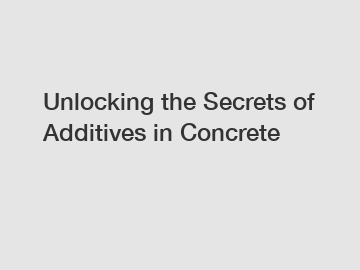Unlocking the Secrets of Additives in Concrete
Concrete is a versatile and durable building material that is used in a wide range of construction projects. From sidewalks and driveways to bridges and skyscrapers, concrete plays a crucial role in modern infrastructure. While the basic ingredients for making concrete - cement, water, and aggregates - are well known, the addition of certain additives can enhance the performance and properties of the final product. In this article, we will explore the secrets of additives in concrete.
## Types of Additives.
There are many different types of additives that can be used in concrete to achieve specific goals. Some additives are designed to improve the workability of the concrete, making it easier to place and finish. Others are used to enhance the strength, durability, or appearance of the finished product. Common additives include:

### Plasticizers.
Plasticizers are additives that reduce the water content of the concrete mix while maintaining its workability. By increasing the fluidity of the mix, plasticizers make it easier to place and compact the concrete, resulting in a smoother finish. This can be particularly useful in applications where a high level of detail or a smooth surface is required.
### Accelerators.
Accelerators are additives that speed up the curing process of concrete, allowing it to achieve its final strength more quickly. This can be advantageous in cold weather conditions or in projects where a fast turnaround time is required. Accelerators can also be used to increase the early strength of the concrete, reducing the risk of damage during construction.
### Retarders.
Retarders are additives that slow down the setting time of concrete, allowing for more time to place and finish the mix. This can be beneficial in hot weather conditions or in large projects where extended working time is needed. Retarders can also be used to prevent cold joints or surface cracking in the finished product.
## Benefits of Additives.
The use of additives in concrete offers a wide range of benefits, including:
- Improved workability.
- Enhanced strength and durability.
- Faster curing time.
- Reduced water content.
- Increased resistance to freeze-thaw cycles.
- Enhanced aesthetic appeal.
By selecting the right additives for a specific project, contractors and engineers can optimize the performance and properties of the concrete, resulting in a better end product.
## Conclusion.
In conclusion, the use of additives in concrete is a powerful tool that can unlock a wide range of benefits. Whether you are looking to improve workability, strength, durability, or appearance, there is an additive that can help you achieve your goals. By working with a knowledgeable supplier or manufacturer, you can find the right additives for your project and ensure that your concrete performs to its full potential.
For more information on additives in concrete or to inquire about specific products, please contact us. Our team of experts is here to help you find the perfect solution for your construction needs.
For more information, please visit hpmc manufacturers, pp fibre, gypsum retarder.
188
0
0

Comments
All Comments (0)